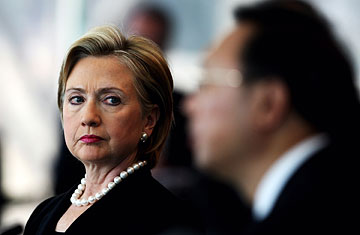
U.S. Secretary of State Hillary Clinton looks at Chinese Foreign Minister Yang Jiechi during a press conference in Beijing on Feb. 21, 2009
Ahead of her first trip abroad as Secretary of State, Hillary Clinton said she planned to renew U.S. focus on Asia, which she suggested the Bush administration had ignored. In China, that new attitude of engagement has been cautiously welcomed. "For many years the U.S. has been accustomed to delivering its demands to China, and this situation should change," the popular nationalist tabloid Global Times put it on the morning of Clinton's arrival. "The U.S. can no longer control China, moreover make more demands of us."
On Saturday in Beijing, Clinton obliged, and gave indications of a softer U.S approach. She spoke repeatedly of a "positive and cooperative relationship" between the two countries. "We spent a great deal of time on the array of global problems that China and the United States face together and that we can work together to solve," she said after meeting with Chinese Foreign Minister Yang Jiechi. "It's important to the global community, which is counting on China and the United States to collaborate to security and peace and prosperity for all." En route to Beijing she told reporters that she wouldn't allow discussions over key issues like the global economy, security and climate change to be sidetracked by talk about China's human rights record, a topic that has long been a source of friction between the two nations. Clinton herself gave a strident speech promoting human rights during a 1995 women's conference in Beijing. (Read "Will Beijing Respond to Clinton’s Diplomatic Wish List?")
Now as Secretary of State, Clinton is avoiding that sort of provocation. During her three-day visit to Beijing, she plans to visit a church Sunday morning and meet with female NGO and civil society leaders at the U.S. embassy later in the day, seemingly choosing subtle example over fiery talk. The "efforts of civil society, women's groups, NGOs, academic institutions" are at least as important as discussions between governments in promoting human rights, Clinton said. Some human rights groups expressed disappointment at Clinton's approach to the issue in China.
After meeting with Yang, Clinton announced a tentative plan to hold regular high-level talks between the U.S. and China. During the Bush administration Treasury Secretary Henry Paulson led a Strategic Economic Dialogue with China, but under the new system, both Treasury Secretary Timothy Geithner and Clinton would lead discussions divided into two tracks: economic and strategic, which includes a broad range of "political and security and global issues," she said. (See 25 people to blame for the global financial crisis.)
China has already indicated that it won't be shunted aside — or shoulder the blame — when it comes to discussions of the financial crisis. As China's manufacturing sector reels from the global drop in demand for its wares, trade will likely dominate all near-future discussions with the U.S., China's biggest trade partner, and could become the primary source of bilateral friction. In a January speech at Davos, Chinese Premier Wen Jiabao lectured about the "inappropriate macroeconomic policies of some economies" with low rates of savings and high consumption — an "unsustainable model of development." In other words, the U.S. When outgoing U.S. Treasury Secretary Paulson was quoted as suggesting that China's high rate of savings helped set off the worldwide crisis by lowering interest rates and encouraging high-risk investment, the state press launched a loud and extended attack. Paulson eventually clarified that he thought the crisis had many causes, and the majority of his criticisms were meant for the U.S. When Geithner later said China has been manipulating its currency during a Senate review of his appointment, he set off a similar outburst of criticism. (Read “How to Heal the Global Economy.”)
The trade deficit with China reached an all-time high of $266 billion last year, prompting U.S. complaints of unfair trade practices by Beijing. Meanwhile China has bashed what it calls efforts by the U.S. to promote protectionism. As money from China's $586 billion stimulus program begins to flow, some economists expect that it will encourage export production faster than it stimulates domestic consumption. If that's the case, the Sino-U.S. trade gap and the resulting economic tensions will only swell.
Yang signaled that China was willing to work with the U.S. on trade, human rights and reducing carbon emissions. And Clinton's emphasis on discussion and consultation has thus far resonated with China. "I think in principal China wants the Obama administration to adopt a cooperative approach to dealings, rather than a confrontational approach," says Yan Xuetong, director of the Institute of International Studies at Tsinghua University in Beijing. "They would like to begin talking about things on an equal footing."
The grave global economic picture will mean other issues in the Sino-U.S. relationship are pushed aside in the early stages of the Obama presidency. Clinton brought along Todd Stern, the State Department's new special envoy on climate change, and will visit a high-tech, low-emissions power plant built with GE technology outside the Chinese capital to emphasize the potential for U.S.-China cooperation on greening industry. But experts don't expect any sort of quick agreement between the world's two largest polluters. "This is just the initial step to start talking about the issue," says Yan. "During the Bush administration China and the U.S. cooperated with each other pretty well: they cooperated to ignore climate change. Now they are looking to cooperate to control climate change."
